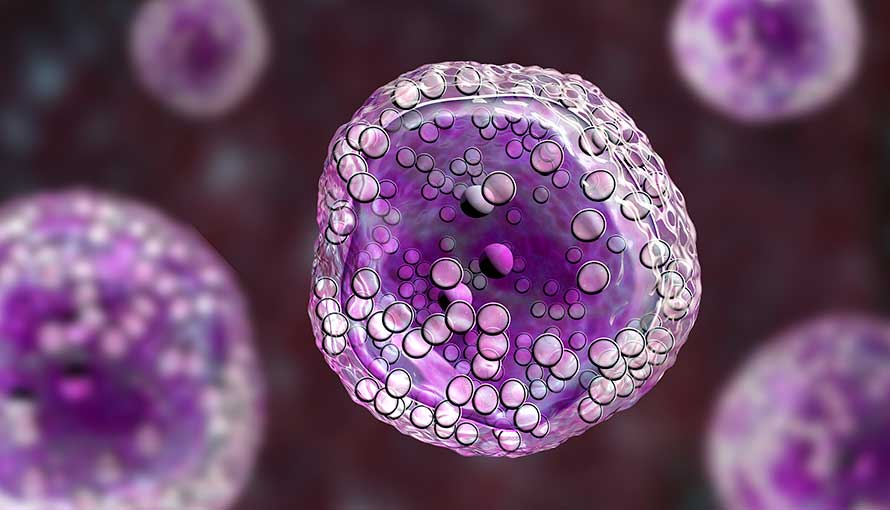B-Cell Lymphoma Information

More than 85% of all non-Hodgkin lymphoma diagnoses are B-cell lymphomas. This cancer subtype originates in B lymphocytes, a type of white blood cell that is produced in the bone marrow and aids in antibody production and immune function.
B-cell lymphoma types
Non-Hodgkin lymphoma is generally categorized into two types—B-cell lymphoma and T-cell lymphoma—and these subtypes can be divided even further. There are multiple forms of B-cell lymphomas, including (but not limited to):
- Diffuse large B-cell lymphoma
- Primary mediastinal B-cell lymphoma
- Follicular lymphoma
- Mantle cell lymphoma
- Small lymphocytic lymphoma
- Mucosa-associated lymphoid tissue (MALT) lymphoma
- Nodal marginal zone B-cell lymphoma
- Splenic marginal zone B-cell lymphoma
- Burkitt lymphoma
- Lymphoplasmacytic lymphoma
- Hairy cell leukemia
- Primary central nervous system (CNS) lymphoma
- Primary intraocular (eye) lymphoma
Details of a patient’s B-cell lymphoma treatment plan will depend largely on the type of cancer present, along with how far it has spread, the patient’s overall health and other factors.
Causes of B-cell lymphoma
B-cell lymphoma occurs when lymphocytes multiply uncontrollably. While the exact cause of this rapid cell division isn’t fully understood, researchers have identified several risk factors that may increase the likelihood of developing B-cell lymphoma. They include:
- A weakened immune system as a result of a medical condition or immune-suppressing medication
- Prolonged exposure to certain chemicals in weed killers and pesticides
- An autoimmune disease, such as rheumatoid arthritis
- A medical history of mononucleosis, an infection caused by the Epstein-Barr virus
- Advanced age (older than 60)
Anyone can develop B-cell lymphoma, including people without any known risk factors. On the other hand, having one or more risk factors does not mean that a B-cell lymphoma diagnosis is imminent. Individuals who are at an increased risk are encouraged to be especially mindful of symptoms and speak with a medical professional if they occur.
Signs and symptoms of B-cell lymphoma
The signs and symptoms of B-cell lymphoma can vary significantly based on the cancer’s specific type. Generally speaking, B-cell lymphoma is most commonly associated with:
- Swollen lymph nodes
- Fever or chills
- Night sweats
- Loss of appetite
- Unexplained weight loss
- Intense itching
- Frequent coughing
- Belly pain or swelling
- Difficulty breathing
- Weakness or fatigue
B-cell lymphoma may not cause any noticeable symptoms in its early stages. As the disease progresses, symptoms usually become more apparent.
People with possible signs of lymphoma should be promptly evaluated by a medical professional who can provide a diagnosis and appropriate treatment. As with most other cancers, early diagnosis of B-cell lymphoma can lead to a better outcome and quality of life.
B-cell lymphoma treatment options
Many types of B-cell lymphoma respond well to treatment, which may include a combination of:
- Chemotherapy to damage cancer cells throughout the body
- Radiation therapy to destroy cancer cells in a particular area of the body
- Immunotherapy to encourage the immune system to target cancer cells
- Stem cell transplantation to help the body fight cancer when other treatments are not effective
Our approach
Positioned firmly at the forefront of cancer care and research, Moffitt Cancer Center provides progressive treatment options for all types of B-cell lymphomas in our widely recognized Malignant Hematology Program. Our multispecialty lymphoma treatment team focuses exclusively on hematological malignancies and collaborates regularly to create and refine individualized treatment plans for each patient. Trailblazing clinical trials for B-cell lymphomas are also available through our clinical trial program, allowing our patients to receive breakthrough therapies before they’re widely accessible.
Call 1-888-663-3488 if you would like to consult with a Moffitt oncologist about your B-cell lymphoma treatment options or to receive a second opinion. You may also request an appointment by completing a new patient registration form online.
